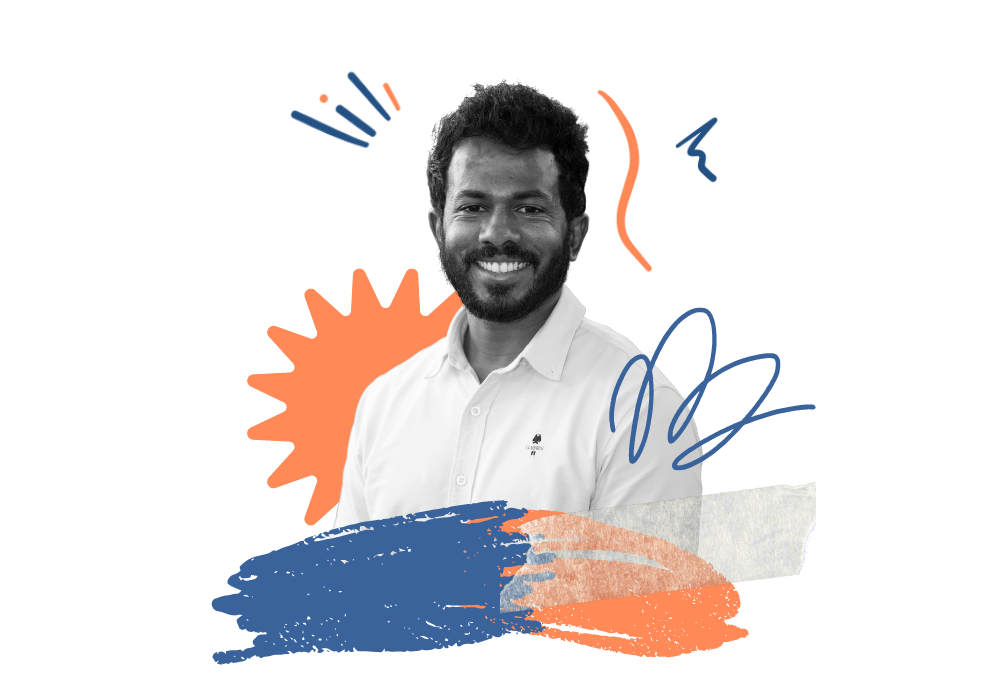சுஜன்
Can you tell us a bit about your cultural background and where you were before deciding to become/run as a politician?
I am Tamil from Sri Lanka, I moved to Australia when I was 15 years old and went to high school and then went to Territory College. I did my Marketing and Business degree and then started doing Marketing Administration at ANU. In 2009, there was a big war in Sri Lanka, and I got heavily involved with protests and human rights activities. Since then, I decided to join a political party which is the Greens, and since then I’ve been with Greens. During the time of the civil war, we gathered in massive numbers and without political influence, we couldn’t really make any change even with the amount the numbers that we had. I also realised here in Australia that we have opportunities that we can contribute to the Australian community, including the people I live around. If you want to make a change, you really got to be in the right place for those changes and I feel that if you feel a politician at any level (local, State, Federal), you can make the change there.
Has your cultural upbringing influenced the way you interacted with politics?
To be honest, in my household we have two different approaches. My mum is very interested in politics because of what’s been happening in Sri Lanka, whereas my dad is the kind of person that would like to sit on the side and just observe, he doesn’t like to get involved into anything that will turn into trouble. So, my mum has been being a big supporter of any activities that I get involved in, especially when I got involved with politics. When I was approached about this opportunity [to run], I had a conversation with my mum and said, ‘I’ve been approached, what do you think?’ and she said ‘yeah, go for it’. So, she was being very supportive but on the other side my dad would say, ‘why would you get involved in this?’. There are so many things that could go wrong: they could get my name wrong; I could easily be attacked by people that don’t even know me, I could be attacked for the colour of my skin, the party I represent, or my religious beliefs. But this is the journey that you have to take in order to make changes in the future.
” They could get my name wrong; I could easily be attacked by people that don’t even know me, I could be attacked for the colour of my skin, the party I represent, or my religious beliefs. But this is the journey that you have to take in order to make changes in the future. “
Sujan Selven
How were you supported as an Asian Australian in/contending to be part of the political scene?
My community was being very supportive of me entering politics and I also had really good friends from the start. A good example was that at my first election, I had 172 individuals who volunteered for my campaign which has never happened in my party for someone running for the first time.
At the same time, during campaigning and on election day, my volunteers had been attacked by different people for political reasons or racism. There was one incident where someone took my leaflet and took a few steps and came back and said, ‘I’m not voting for a black person.’ And in recent days, we were harassed by a small minority of people, which does not discourage me. If you’re looking to getting into politics, these sorts of incidents happen all the time and that you have to remember that it’s not directed towards you, sometimes it’s directed at the party or where you come from. You should stay strong and have conversations with your friends and family to get support. Focus on how you can get to a place to make change rather than being distracted from unknown faces who are trying to stop you for different purposes. To be honest, sometimes I do get upset by it, but I still have a long journey.
Do you think as a person of colour politician that racism and discrimination is a hazard?
Yes, because it’s a new thing in Australia where Politicians of Colour exist in Parliament. We are a multicultural country and we made up of different multicultural communities with different languages, and different cultures. I’m not going to change who you are, I will respect you and work with you, and hopefully that attitude will slowly change over time. It is currently happening. At my last election, I had People of Colour from different organisations who support myself and the community, and these types of supports are how we can travel further to reach our goal. It’s been seven years since I’ve been involved in politics, but in the last two years, I’ve seen a massive change in the groups that are supporting me, it’s a lot more powerful compared to five years ago.
How would you explain the lack of Asian Australian representation in Parliament given how large the community is?
The first reason being is because previously our lived experiences has not necessarily been positive, especially the way we see politics and politicians. But also for us to get into politics, it’s always a negative experience. People get attacked when they campaign for the first time, and it’s not a pleasurable experience and this leads to less participation from people from an Asian background. Therefore, we need to make change and increase representation in the next election, whether it’s State or Federal. It’s small steps but it contributes to a bigger conversation and for a bigger purpose. Unless we respect and understand each other, it will be a long journey. It’s not helping the economy, or the country we want to be part of this country, and if we felt part of this country, we can contribute a lot more. A good example is the Aboriginal communities who are waiting for a treaty, we should make them part of this country, they are the owners of this country. The future of this country is also going to be made up of multicultural communities and that is what makes Australia so powerful. Once we start accepting that, that’s when we will see change.
Were there any barriers you’ve had to face? And what were they?
My party’s been very positive and supportive. I feel part of the party, I feel comfortable being there. My party doesn’t want us to be politicians, suiting up and being demanding, we want to have connections with people and our agenda is driven by the people. We represent the people you live around, and my party has been supportive in that sense. Competing in the election there is always going to be barriers. You put corflutes on a fence and the next day another party comes and takes it down, or paints it a different colour, or puts funny faces on it, all sorts of things. They are the barriers I see which discourage people. But because of my party, I feel lucky to contribute and happy to be running in the federal election. Every time I’ve campaigned, it’s been a learning experience, and I learn something different every time.
What would you say to young Asian Australians who are voting for the first time in this election?
Nowadays because of increased literacy there is more political awareness of where people want to put their votes. But what I want young people to know is that while your parents follow a political party, you can stop and actually take the time to look for yourself. Your parents have been following that party for the last 20 – 30 years and there’s a lot of change since then. You can use ABC vote compass and you can use that checklist to see what interests you and what parties represents your interests. Or you can go into each party’s policies individually to research on who you would be voting for. I also highly recommend thinking about what party you will be putting second, preferential voting will make a big difference at this election. Because both of major parties will have closely contested seats, minor parties will play a bigger role in this election. Preferences will also make a massive difference and change. Doing researching is important because you can make an informed decision when you do that. I was listening to the ABC radio, there was a low number of voters at a younger age. I remember my time as a young person (in high school), I was really into cars and once you finish high school your opinions may change. But your vote matters, and it effects your education, health system, transport, employment and all those types of things. It takes a few minutes to do some research and if you need help talk to your friends or family but make your own informed decision to make your vote count.

What advice would you give to those who want to make a change in their community?
There are so many organisations nowadays. Before I got into politics, I was part of my local community organisations and I was interested in areas such as human rights activism and refugee issues. Whatever issues you’re interested in such as the environmental issues just get involved with them in your local area or anywhere. It could be Sydney Alliance, Amnesty International or Red Cross, you can involve in your local group and then start slowly and see where it takes you with your experience or whether you want to start different. That way you can build the foundations on whether you have a taste for a particular issue or not. You can slowly build your experience and knowledge through research and participation, and it will give you direction in the future. That what works for me. When I joined my community organisations, my interest wasn’t to get into politics, it was more to “fix the problem” or advocate for issues, but my interests had slowly got me into world and geo-politics. The current political decisions made in this country has impacted the people from my culture, the people back home, or my family’s livelihood or my future. If I want to make changes, I can do that through activism, or I can exercise my vote, or I can campaign with local groups. Whatever that suits you, whatever you think is the right thing to do, I think that’s where you should start.
If you had to introduce one aspect of Tamil culture to the broader non-Asian community what would it be?
Serving food. To the extreme, when you’re not hungry they still feed you food. The first people ask you when you go to someone’s house is ‘what did you eat?’ or ‘have you eaten yet?’. The culture is placed in having a big family and having a lot of food. That is something I want to encourage and support. Tamil New Year is coming up so I think it’s a good time to celebrate and I want to see that celebration here in Australia as well.


Leave a comment